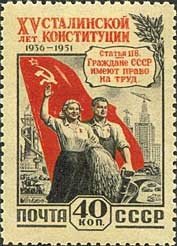Stamp: Right to work (Article 118 of Constitution of the USSR) (Soviet Union, USSR 1952)
Right to work (Article 118 of Constitution of the USSR) (Soviet Union, USSR 1952)
15 May (Soviet Union, USSR ) within release Politics goes into circulation Stamp Right to work (Article 118 of Constitution of the USSR) face value 40 Russian kopek
| Stamp Right to work (Article 118 of Constitution of the USSR) in catalogues | |
|---|---|
| Michel: | Mi:SU 1628 |
Stamp is square format.
Also in the issue Politics:
- Stamp - Right to education (Article 121 of Constitution of the USSR) face value 40;
- Stamp - Right to work (Article 118 of Constitution of the USSR) face value 40;
- Stamp - Right to rest (Article 119 of Constitution of the USSR) face value 40;
Stamp Right to work (Article 118 of Constitution of the USSR) it reflects the thematic directions:
A flag is a piece of fabric (most often rectangular or quadrilateral) with a distinctive design that is used as a symbol, as a signaling device, or as decoration. The term flag is also used to refer to the graphic design employed, and flags have since evolved into a general tool for rudimentary signalling and identification, especially in environments where communication is similarly challenging (such as the maritime environment where semaphore is used). National flags are patriotic symbols with varied wide-ranging interpretations, often including strong military associations due to their original and ongoing military uses. Flags are also used in messaging, advertising, or for other decorative purposes. The study of flags is known as vexillology, from the Latin word vexillum, meaning flag or banner.
In microeconomics, an industry is a branch of an economy that produces a closely related set of raw materials, goods, or services.For example, one might refer to the wood industry or to the insurance industry.
Agriculture is the cultivation and breeding of animals, plants and fungi for food, fiber, biofuel, medicinal plants and other products used to sustain and enhance human life.[1] Agriculture was the key development in the rise of sedentary human civilization, whereby farming of domesticated species created food surpluses that nurtured the development of civilization. The study of agriculture is known as agricultural science. The history of agriculture dates back thousands of years, and its development has been driven and defined by greatly different climates, cultures, and technologies. Industrial agriculture based on large-scale monoculture farming has become the dominant agricultural methodology.
Politics (from Ancient Greek πολιτικά (politiká) 'affairs of the cities') is the set of activities that are associated with making decisions in groups, or other forms of power relations among individuals, such as the distribution of status or resources. The branch of social science that studies politics and government is referred to as political science
A woman is an adult female human. Before adulthood, a woman is referred to as a girl (a female child or adolescent)
A people is a plurality of persons considered as a whole, as is the case with an ethnic group or nation. Collectively, for example, the contemporary Frisians and Danes are two related Germanic peoples, while various Middle Eastern ethnic groups are often linguistically categorized as Semitic peoples.
An anniversary is the date on which an event took place or an institution was founded in a previous year, and may also refer to the commemoration or celebration of that event. For example, the first event is the initial occurrence or, if planned, the inaugural of the event. One year later would be the first anniversary of that event. The word was first used for Catholic feasts to commemorate saints. Most countries celebrate national anniversaries, typically called national days. These could be the date of independence of the nation or the adoption of a new constitution or form of government. The important dates in a sitting monarch's reign may also be commemorated, an event often referred to as a "Jubilee".





